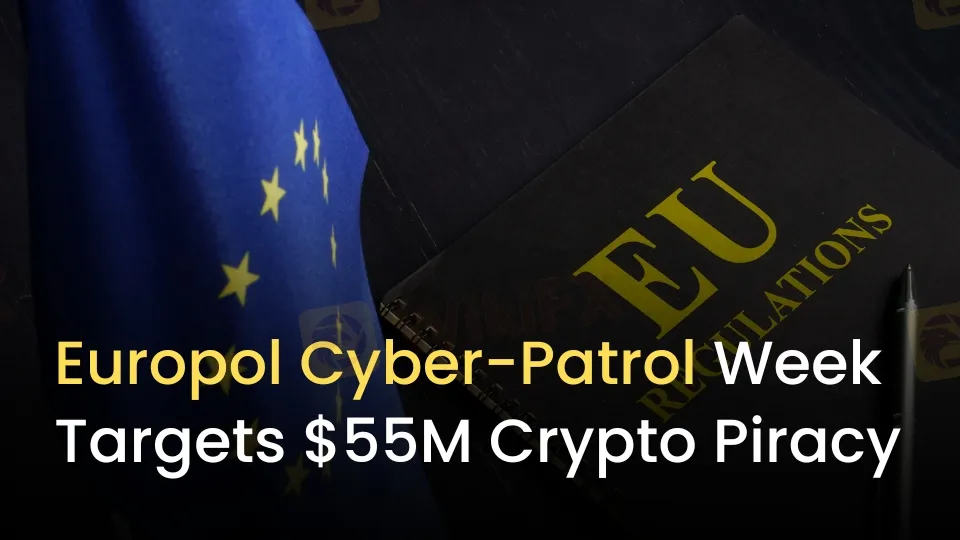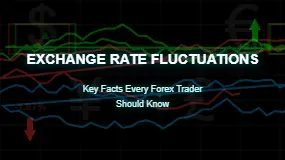WikiFX Officially Launches the “Every Review Counts” Broker Review Initiative!
In forex trading, what truly determines risk is often not market volatility itself, but whether information is authentic, transparent, and fully visible.
简体中文
繁體中文
English
Pусский
日本語
ภาษาไทย
Tiếng Việt
Bahasa Indonesia
Español
हिन्दी
Filippiiniläinen
Français
Deutsch
Português
Türkçe
한국어
العربية
Abstract:Europol’s Cyber-Patrol Week exposed $55M in illicit crypto tied to IPTV piracy, disrupting sites and strengthening EU intellectual property enforcement.

Between 10 and 14 November, Europol, the European Union Intellectual Property Office (EUIPO), and Spain‘s Policía Nacional coordinated a sweeping enforcement action against online intellectual property crime. The initiative, branded “Intellectual Property Crime Cyber-Patrol Week,” brought together 30 investigators at EUIPO’s Alicante headquarters. Using advanced Open-Source Intelligence (OSINT) and digital investigative tools, they mapped illicit services and traced financial flows hidden behind cryptocurrency transactions.
The scale of the operation was striking:
Collectively, these sites attracted an estimated 11.8 million annual visitors, underscoring the reach of illegal streaming and counterfeit content networks. Investigators tracked cryptocurrency flows worth USD 55 million (EUR 47 million) across accounts linked to these services, highlighting the financial backbone of modern piracy.

A central theme of the Cyber-Patrol Week was the migration of criminal enterprises from traditional payment systems to cryptocurrency. Organisers noted that illicit operators increasingly rely on digital assets, believing them to provide anonymity.
Investigators countered this assumption with a novel tactic: purchasing services directly with cryptocurrency. This allowed them to trace transactions, identify operators, and flag accounts to partner organisations, including major exchanges and blockchain analytics firms.
By targeting the financial infrastructure of piracy, authorities struck at the core of criminal profitability. Shutting down crypto accounts not only disrupts revenue streams but also deters future operators who rely on perceived anonymity. Europol emphasised that this financial disruption is critical to safeguarding creators, legitimate businesses, and the wider economy.
The Cyber-Patrol Week was more than an enforcement exercise—it was a platform for innovation and collaboration. Investigators developed actionable intelligence packages, shared best practices, and tested new technological solutions.
More than 15 countries and private-sector partners joined the initiative, pooling expertise to tackle illegal streaming and counterfeit distribution. This collaborative model reflects the European Unions broader commitment to a cross-border enforcement strategy, where cooperation and technology form the backbone of intellectual property protection.
The event reinforced the importance of public-private partnerships. By aligning enforcement agencies with crypto exchanges, cybersecurity firms, and rights holders, the EU is building a resilient framework to anticipate and neutralise emerging threats in the digital economy.
Europol‘s Cyber-Patrol Week demonstrates how coordinated enforcement, technological innovation, and financial disruption can reshape the fight against intellectual property crime. By exposing USD 55 million in illicit crypto flows and dismantling IPTV piracy networks, the operation highlights the EU’s determination to protect creators and strengthen trust in the digital marketplace.
Events like these signal a clear message: piracy may adapt, but so too will enforcement. With international collaboration and advanced investigative tools, intellectual property crime faces mounting pressure in Europes evolving digital landscape.

Disclaimer:
The views in this article only represent the author's personal views, and do not constitute investment advice on this platform. This platform does not guarantee the accuracy, completeness and timeliness of the information in the article, and will not be liable for any loss caused by the use of or reliance on the information in the article.

In forex trading, what truly determines risk is often not market volatility itself, but whether information is authentic, transparent, and fully visible.

The forex market is a happening place with currency pairs getting traded almost non-stop for five days a week. Some currencies become stronger, some become weaker, and some remain neutral or rangebound. If you talk about the Indian National Rupee (INR), it has dipped sharply against major currencies globally over the past year. The USD/INR was valued at around 85-86 in Feb 2025. As we stand in Feb 2026, the value has dipped to over 90. The dip or rise, whatever the case may be, impacts our daily lives. It determines the price of an overseas holiday and imported goods, while influencing foreign investors’ perception of a country. The foreign exchange rates change constantly, sometimes multiple times a day, amid breaking news in the economic and political spheres globally. In this article, we have uncovered details on exchange rate fluctuations and key facts that every trader should know regarding these. Read on!

Discover PU Prime’s new campaign, “The Grind,” and learn how trading discipline builds long-term success. Watch and start your trading journey today!

IG boosts FCA compliance by integrating Adclear’s AI tools. Learn how automation accelerates marketing approvals and ensures regulatory accuracy.
